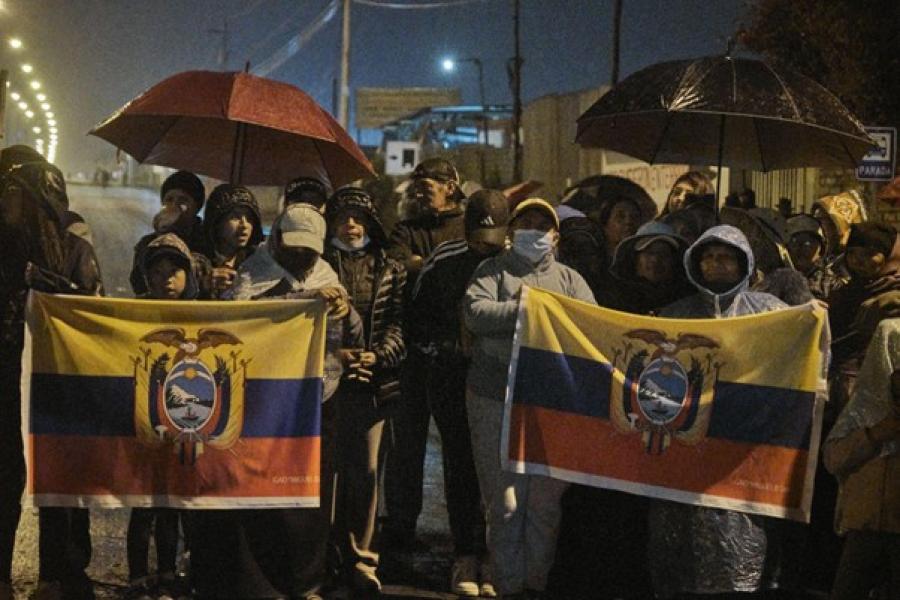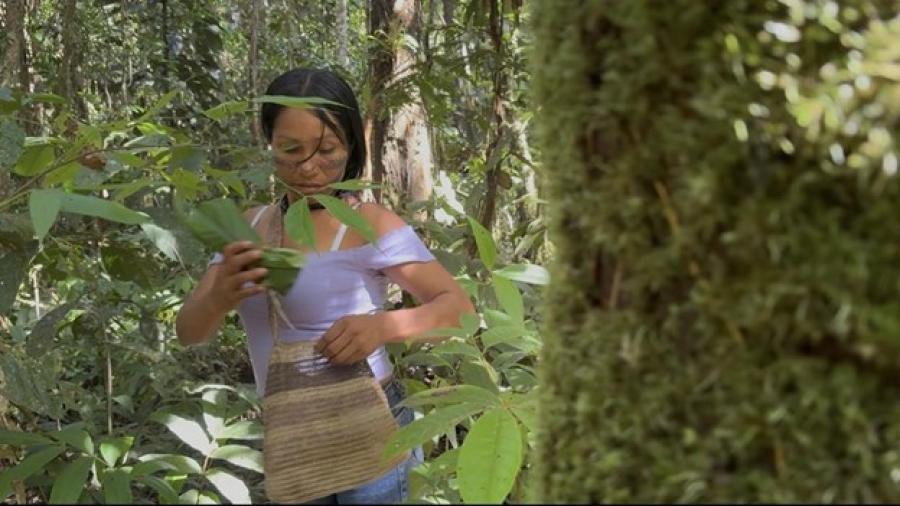In order to speak about the last 25 years of the indigenous movement in Ecuador, we should locate ourselves within the wider context and the historical situation. In order to understand the dynamics of our movement, we must look at the causes. In these causes we find the accumulation of exploitation and oppression which we have suffered for more than 500 years, given that even in these days Indians are still the poorest and most marginalized of this society.
"We believe that the most recent events of the 1990s had fundamental origins in the defense and recovery of land and territory, and a clear unity strengthened by a revitalization of ethnic identity of Indian peoples. In addition, we responded to the ideological limits of the political system that surrounds us, as well as the incapacity of democratic governments to incorporate and respond to our demands.
"We see that after more than 500 years of the European invasion and 150 years of the republican regime, Indian rights are still not recognized. The conquest has not ended, rather it continues into our times. New forms of subjugation, exploitation, and oppression are being systematically reproduced, leading to injustice in the lives of our people. The looting of our natural resources, the destruction of our cultures, the ecological imbalance, the burden of the foreign debt-in other words, the domination and subjection of our people has not ended. With few exceptions, the governments of Latin America have not applied authentic and democratic land reform. Our people's struggles for land are repressed, our cultural values disparaged, and an alienating culture is imposed upon us that silences our own cultural expressions. For these reasons we have searched for the road to unity among the different indigenous peoples of Ecuador. Now, we have the hope of constructing new societies where the ethnic and cultural rights of the indigenous nationalities will be respected and recognized."
Our Objectives
"The important task is to seek the construction of an alternative social project that responds both to our history and to the interests of all of Ecuador. We want to exercise the legitimate right of self-determination which we believe to be a fundamental goal in achieving our liberation. The consolidation of this objective will not only be the exclusive task of Indian Peoples, but it will be a social compromise that we should make, among all of the sectors of society who are convinced of the need for a pluralist, democratic society where justice and peace are guaranteed.
"At this time, the living conditions of our people are extremely miserable. There is an accelerated erosion of our productive means, malnutrition, acculturation, unemployment-in other words, a general social disintegration is occurring. The fundamental problem is the scarcity of land which has led to the migration of Indians to the cities, where we are left to the most menial of jobs, mistreated, and underpaid.
"The State has developed policies which have not solved the structural problems of our society The programs applied in the rural area have served only to further the needs of capitalist modernization in agro-industries. The series of agrarian transformations of the 1960s and 1970s, only served to suppress the feudal forms of production which were obstacles to development; they were a tool to calm the indigenous insurrection. These reforms never affected the interests of the large ranchers and farmers, given that the best lands are still concentrated in very few hands, three million people have only 4% of the cultivable land (plots are smaller than 5 hectares). On the other hand, about 200,000 people control about 50% of the land (landholdings are 100 hectares or more).
"The projects of colonization in the Amazon and the coastal regions have not been favorable for our peoples; the situation has worsened. Through the system of colonization, the theft of natural resources has been legitimized, as well as the appropriation of natural resources by large businesses. Little by little, we are pushed further and further into the corners of the forest without the chance for a dignified existence.
"In the face of this structural and historical situation, the indigenous people of Ecuador have responded with different forms of struggle and resistance including rebellions, mobilizations, uprisings, and most importantly, the organization and the unity of our people. Likewise we have responded with the affirmation of our culture and identity in relation to our languages, customs, beliefs, and traditions, as our own forms of consciousness and resistance in the face of domination.
"Not one of the democratic governments in Ecuador has brought a significant or favorable change for the popular sectors of the country. We think, on the contrary, that the situation is worsening. The conditions of life have deteriorated, inflationary processes continue, and the people are still in conditions of extreme poverty."
Land and Self-Determination
"Among our primary demands, which are not new, is the fight to land and territory. We do not think there will be a solution to the problems of indigenous people if there is no solution to the problem of land. The essential task for us is the recovery of land. Land is of course the indispensable condition for life, for the existence of a people, and for our development. Without this basic element, it is impossible to have conditions for educating children, lead healthy lives, and reproduce our cultures.
"With respect to the State, it should understand and apply the universal human rights for indigenous people. Likewise, our demands include the reform of Article 1 of the Constitution of the State, recognizing the country as a multicultural State, since we consider ourselves indigenous nationalities that make up part of this multicultural State. The reform of the Constitution would imply the reconstruction of the State as multicultural, pluralist, and democratic; not solely to grant the rights of indigenous people, but all of Ecuadorian society together.
"This demand is directed at the same time as the constitutional reordering and the creation of laws and judicial instruments that will give us the right to self-government. This consists of creating a system of self-government that allows us legal control over the administration of the internal affairs of our communities within the framework of the national State.
"Since we are Ecuadorians, during recent years we have also demanded support from the State to finance our self-initiated programs to develop infrastructure, basic social services, grants of small loans, and technical assistance to aid in improving productivity and the sale of our products. Indigenous people's labor, of course, supplies the majority of the food produced in the country.
These are the most important aspects of our struggle during recent years. We are not demanding anything outrageous, strange, or new. We only ask for justice, and for understanding and compliance on the part of the State."
Our Contributions to Democracy
"With the Indian uprising in June of 1990, the March of the Organizations of Indigenous Peoples of Pastaza (OPIP) in April and May of 1992, and the mobilizations of the indigenous communities in June of 1994 in opposition to the Law of Agricultural Development, the indigenous movement has been a protagonist of the most authentic forms of protest within a process of struggle and resistance. We will continue to pursue this struggle in order to achieve land, liberty, and dignity.
"These historic events have led us to confront a number of challenges and responsibilities. We realize that we are a social and political force with significant influence. We have won a space within society and we seek true democratic participation, as we represent the aspirations of Ecuador's poor. We have and will continue to call for justice. We will not allow ourselves to be divided, nor will we allow outside influences within our movement that do not respond to the true and legitimate demands of the indigenous people."
Article copyright Cultural Survival, Inc.



